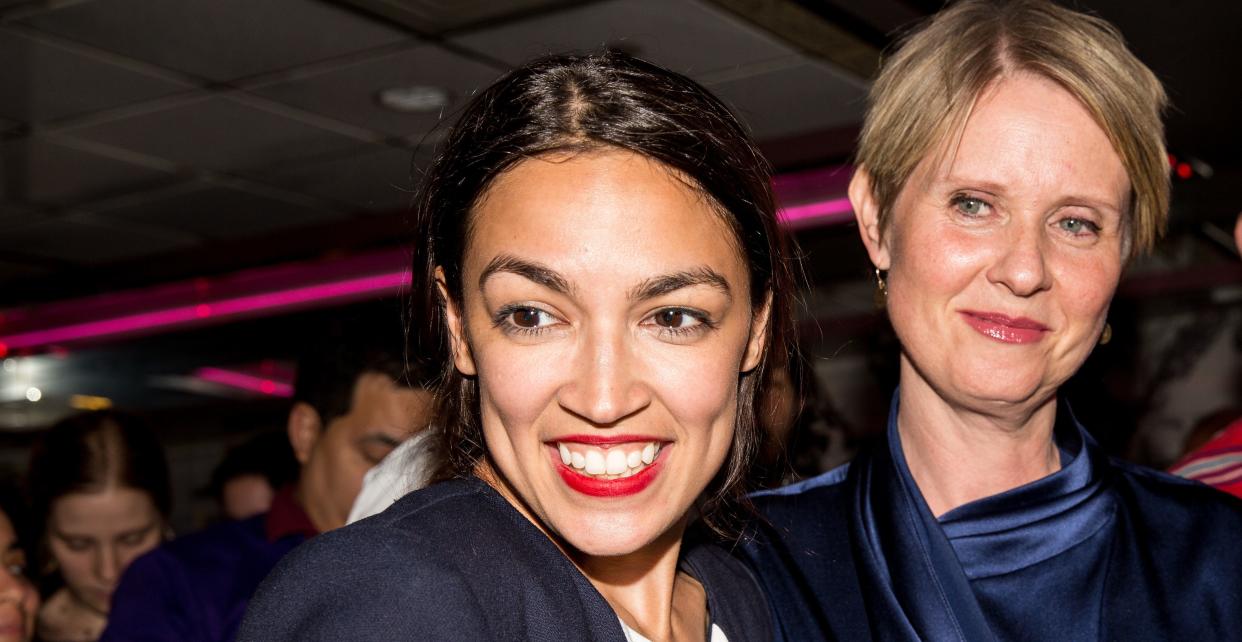Alexandria Ocasio-Cortez Just Made The Democratic Party Safe For Democracy Again

In the Democratic Party primary for New York’s 14th Congressional District, progressive political outsider Alexandria Ocasio-Cortez was outspent by 10-term incumbent Joe Crowley more than 17 to 1.
Crowley went all-out, pouring $3.4 million into the race, according to the latest figures from the Center for Responsive Politics. The money was raised from some of the biggest names in corporate America ― private equity titan Blackstone, health insurance giant Aetna, Nasdaq, Google, Facebook, Comcast, Boeing, Verizon, AT&T, Microsoft, Goldman Sachs, JPMorgan Chase, Morgan Stanley, General Electric, Northrop Grumman and Bank of America, among others.
Ocasio-Cortez spent just under $200,000, none of it from corporate political action committees or lobbyists. And she beat the hell out of him. With just a handful of precincts left to be counted Wednesday morning, the 28-year-old Democratic Socialist held a 15-point lead over Crowley, who had conceded the race several hours earlier.
The way Ocasio-Cortez ran her campaign will change the Democratic Party at least as much as the policies at the heart of her candidacy.
Ocasio-Cortez thrilled lefties across the country by calling on Congress to abolish the Immigration and Customs Enforcement agency, establish a “Medicare for all” health insurance program and implement a federal jobs guarantee. But these were all manifestations of an overarching, small-d democratic idea that Ocasio-Cortez summed up in a compelling campaign video.
“This race is about people versus money,” Ocasio-Cortez said. “We’ve got people, they’ve got money.”
These are the words of an organizer. Washington, however, is dominated by an army of lobbyists, lawyers, economists and consultants who insist that money in politics always matters more than people.
Among Republicans, the political priority of wealth isn’t really controversial. In April, Mick Mulvaney, director of the Office of Management and Budget, told lobbyists at the American Bankers Association that when he served as a congressman, he simply refused to meet with anyone who hadn’t contributed financially to his election. (His actual constituents in South Carolina were exempted from this ban.)
But Democrats are at least nominally uncomfortable with this idea, both because it is corrupt and because for more than 80 years, Democrats have understood themselves to be the party of the people, the party of progress and equality. So Big Money Democrats and Big Money groups that want to win over Democrats deploy swarms of metaphors and euphemisms to distract from their fundamentally anti-democratic enthusiasm for corporate cash. No Labels celebrates “problem solvers,” while Third Way embraces the moniker of “radical centrists.”
Democratic Party leaders typically plead pragmatism on Big Money. Less than a year ago, former Hillary Clinton aide Zerlina Maxwell expressed the reigning ideology during an appearance on Joy Reid’s MSNBC program. She essentially declared the yet-to-be-launched Ocasio-Cortez campaign an impossibility.
“I think that the ideological purity that some Bernie Sanders supporters want to implement in the Democratic Party is really a manifestation of privilege,” Maxwell said. “People of color and women running for office can’t abide by purity tests because of the structural difficulties in running for office. And the bottom line here is, you need money to win an election.”
The endgame for Maxwell was overturning the Supreme Court’s 2010 Citizens United decision, which allowed corporations to spend unlimited amounts supporting any candidate they want to see in office. Until legislation could be passed ending the electoral advantage held by organized money, Democrats could never win elections by relying on organized people alone, and it would take Democratic victories to defeat Citizens United ― or so the argument went. The only way to get rid of Big Money in the long run was to rake it in right now.
People listen to such fatalism because money really does matter in elections. If it didn’t, the richest and most powerful people in the world wouldn’t keep dumping fortunes into the political process. But not every district is the same. In districts and states where the Democratic Party holds an overwhelming advantage, the power of ideas can indeed overcome the power of money. Ocasio-Cortez just proved it.
Campaigns like Ocasio-Cortez’s can and will soon be launched all over the country. The Cook Political Report lists 31 House districts where the Democratic Party holds demographic advantages at least as strong as those in New York’s 14th and 180 districts that are considered “solid” for Democrats. And a host of Democratic Party organizations are now devoted to getting candidates like Ocasio-Cortez in those seats ― from Move On to Indivisible to Our Revolution and the Democratic Socialists of America. In those upcoming contests, the ability to marshall Big Money will not be a sign of electability, but a scarlet letter.
The very fact that the seats are safe from Republican challenge means that the Democrats who occupy them have the power to sustain a genuinely progressive agenda when they get to Washington. The voters who put them in power over Big Money candidates won’t punish them for voting against Wall Street, Silicon Valley or private prisons.
As Ocasio-Cortez put it at the close of her campaign video: “It doesn’t take 100 years to do this. It takes political courage.”
CORRECTION: Joe Crowley is a 10-term congressman, not a 10-year congressman.
Love HuffPost? Become a founding member of HuffPost Plus today.
This article originally appeared on HuffPost.

